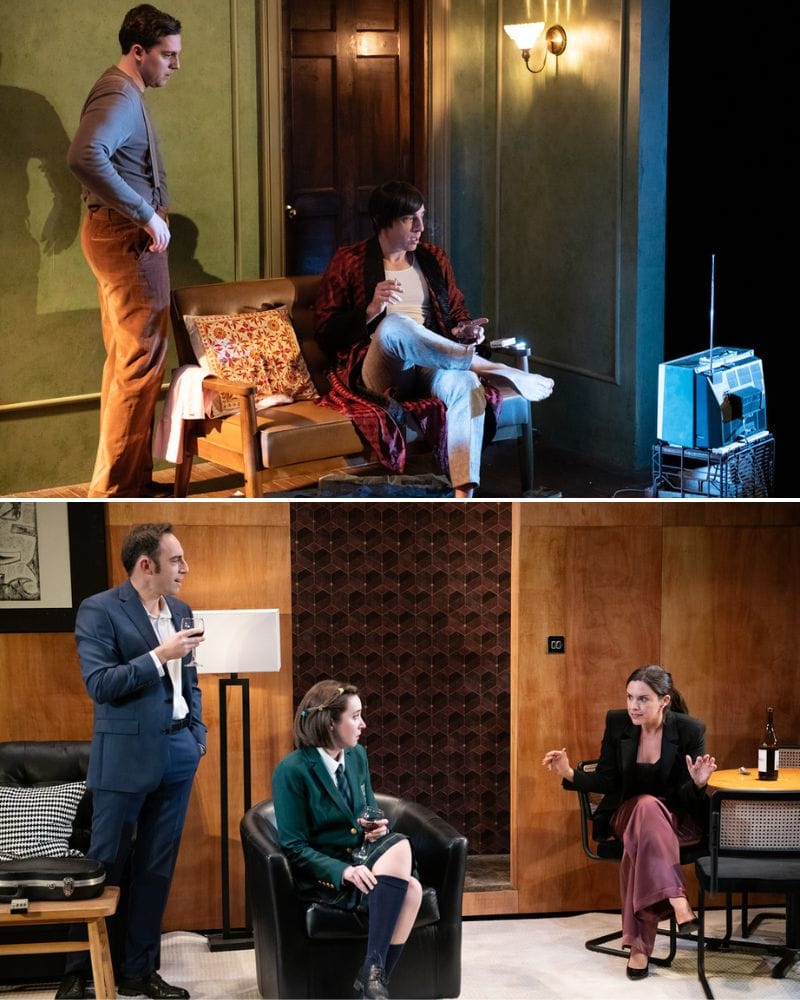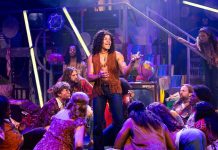Love, Love, Love begins and ends with the Beatles — specifically, “All You Need Is Love,” from which playwright Mike Bartlett lifts the title of his decades-spanning trip through progressive disillusionment. Under the direction of David Muse, Studio Theatre’s production expertly meets the psychological and social insight of Bartlett’s play. The only problem, really, is that it plays a tune we’ve heard before.
The first of Love, Love, Love’s three acts opens in a London apartment in 1967. Would-be intellectual and accomplished layabout Kenneth (Max Gordon Moore) awaits the Beatles’ appearance in a massive broadcast event, sure that it heralds the end of tradition as he knows it. He is a sharp contrast to his brother, the conservative and hardworking Henry (Hunter Hoffman), whose taste for classical music seems to cast him as a man rapidly going out of style. Into the mix steps Sandra (Liza J. Bennett), a free-spirited feminist whom Henry is clumsily wooing. Unfortunately for Henry — then again, perhaps fortunately — sparks fly between his brother and his would-be paramour.

Act two picks up some 20 years later, with Britain in the throes of Thatcherism and Kenneth and Sandra in the throes of a crumbling marriage. Their children, Rose (Madeline Seidman) and Jamie (Max Jackson), already feel the wounds of their parents’ self-absorption. By the time the third act rolls around another 20-odd years later, parents and children find themselves on either side of a generational divide exacerbated by a brutal housing market and a suspicion that the children of the ’60s, as Rose proclaims, bought the world rather than changed it.
Any play about frayed family ties depends on a well-balanced ensemble, and Muse has certainly assembled that in Love, Love, Love. As the central lovers, Moore and Bennett transition easily between youthful exuberance, midlife disillusionment, and retired aloofness. What becomes clear over the course of their journey is that any belief in the revolutionary promises of the 1960s was really a stubborn belief in their own entitlement. That the pair reveals that hard truth while still movingly rendering the ups and downs of their relationship is a credit to them. As the neglected Rose, meanwhile, Seidman counters her stage parents’ naked selfishness with open fragility, positioning herself as the true, tender heart of the play. On the periphery are Hoffman’s Henry, workmanlike in the role of a lifetime worker, and Jackson’s Jamie, whose skittery teenage sensibilities give way to a full-blown but vaguely defined syndrome by the end of the play.
The production at large serves to frame these characters’ social ties — literally, in the case of the stark proscenium placed around the action in Studio’s Shargai space. Apart from a curiously flamboyant musical flourish at the top of the second act, Muse directs all with a steady hand, letting his actors find the beats and silences that fill out their relationship. Backing them is Alexander Woodward’s set, elegant in its simplicity, even when the first act’s cheap London flat is meant to be anything but elegant. As the play progresses, so do Kenneth’s living quarters, first into wood panels and prominent stereo equipment circa late-’80s/early-’90s then to the off-white, open-concept luxury of the late 2000s. As Woodward’s sets expand, so do Montana Levi Blanco’s costumes tighten, taking Kenneth all the way from the smoking jacket and undershirt combo of his early adulthood to an all-black, turtleneck number in his retirement.
In short, Love, Love, Love is lovingly put together. Since the play debuted in 2010, it is also familiar to a fault. As the lobby display curated by dramaturg Adrien-Alice Hansel indicates, the British housing market has, much like its American counterpart, ebbed and flowed with radically different policies since the end of the Second World War. The price of a home, particularly in an active hub like London or indeed Washington, DC, has trended upward, making outright homeownership for many Millennials and Generation Z seem like the stuff of a bygone era. While many theatergoers could perhaps stand to be reminded of these changes, Bartlett only drives home the dissonance between generations on this subject through a modest—or immodest, depending on how you look at it — proposal from Rose at the play’s end. It’s a blunt instrument, yes, but it also produces the play’s most pointed observation about the chasm between parents and children, not to mention the callousness that Kenneth and Sandra’s years of self-proclaimed hard work and financial security have produced.

Ultimately, Love, Love, Love makes the same point it did back in 2010 when the global recession was fresh on the mind. In some ways, that makes it old news, but perhaps the takeaway from this latest production, particularly one as accomplished, is that the point bears repeating. The play gives the lie to the idea that “all you need is love”; it could just as easily say “the more things change, the more they stay the same.”
Running Time: Two hours and 30 minutes with two 10-minute intermissions.
Love, Love, Love plays through February 18, 2024, in the Victor Shargai space at Studio Theatre, 1501 14th St. NW, Washington, DC 20005. Purchase tickets ($40–$100, with low-cost options and discounts available) online or by calling the box office at (202) 332-3300.
The Love, Love, Love program is online here.
COVID Safety: Studio Theatre recommends but does not require patrons to wear masks in the building.





